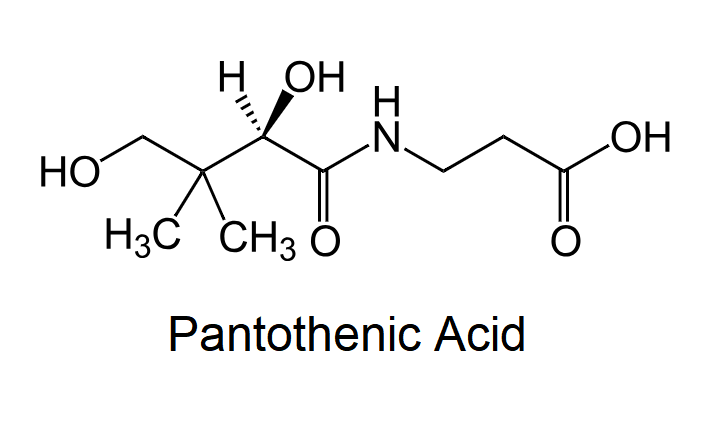Pantothenic Acid

Pantothenic acid or vitamin B5 is one of the less well known B vitamins. In the body, pantothenic acid is a precursor for coenzyme A. Coenzyme A has numerous uses: it plays a role in energy production from both fat and carbohydrates and is involved in fatty acid synthesis, important for cell membranes. One of the first steps in making the steroid hormones, including cortisol, testosterone and estrogen, also relies on coenzyme A (Acconcia 2017).
While pantothenic acid is needed for life, deficiency of the vitamin is rare. Most foods contain pantothenic acid, so most diets provide at least enough for basic needs. However, this doesn’t mean that supplementing pantothenic acid is not useful in some situations. From the published research, there are a number of conditions that might benefit from the supplementation of pantothenic acid, although the evidence is limited with a number of the studies being from the middle of the last century. Conditions that might benefit from pantothenic acid include:
- Rheumatoid arthritis
- Lupus erythematosus
- Skin conditions
- Longevity
Rheumatoid Arthritis
Rheumatoid arthritis is in an autoimmune disease that causes inflammation of the joints, usually in a symmetrical pattern. Early studies found that bone and joint problems occurred when animals were fed a diet deficient in pantothenic acid (Nelson 1950). A study from 1963 explored the blood level of pantothenic acid in healthy individuals compared to those with rheumatoid arthritis (Barton-Wright 1963). Patients with rheumatoid arthritis had low pantothenic acid levels. When injections of pantothenic acid were administered, these patients had improvements in their symptoms as blood levels increased. When the injections were stopped, levels dropped back down and symptoms returned. The authors noted at the end of the study that oral dosing also appeared to hold promise for treatment
A later study supplemented up to two grams per day of pantothenic acid and found improvements in rheumatoid arthritis symptoms (Practitioner 1980). Patients had reduced morning stiffness, improved disability and less chronic pain with supplementation. Unfortunately, there aren’t any recent trials attempting to duplicate the results.
Lupus Erythematosus
Lupus erythematosus is another autoimmune condition that can affect the joints, organs and skin. The condition can occur spontaneously, or can be drug-induced. The drugs that cause lupus are known to be metabolized by enzymes requiring pantothenic acid. As such, it has been hypothesized that lupus is a disease caused or exacerbated by pantothenic acid deficiency (Leung 2004). One study found that high doses of pantothenic acid were effective for subacute (less severe) lupus and discoid lupus, a form of lupus that just affects the skin (Goldman 1950). A separate trial combined high doses of pantothenic acid, up to 12 grams per day, with vitamin E and found a good response in lupus patients (Welsh 1952). Many of the patients had complete clearing or close to complete clearing of skin lesions with the treatment. The same author reported further, similar results in an additional 67 patients in 1954 (Welsh 1954).
However, a study that tried to duplicate the results with much lower doses of pantothenic acid, between 100 and 600 mg per day, did not show efficacy for treating lupus (Cochrane 1952). It appears that high doses of the vitamin alone or in combination with vitamin E may be necessary to achieve benefits.
Skin Conditions

A study of a supplement containing high-dose pantothenic acid (2.2 grams) combined with other nutrients was shown to improve acne after three months (Yang 2014). A study using vitamin C and pantothenic acid (between 0.2 and 0.9 grams per day) for wound healing after surgical tattoo removal found modest effects on scar formation, with supplementation increasing scar tissue strength (Vaxman 1996).
A topical form of pantothenic acid, dexpanthenol, has also shown some promise for skin conditions. For atopic dermatitis, or eczema, topical dexpanthenol has been shown to be effective. A review article found that dexpanthenol improves the skin, reduces flares and enhances skin healing (Cho 2022). A gel combination of dexpanthenol, hydrogen peroxide and salicylic acid has also been shown to be well tolerated and helpful for reducing acne (Ricci 2016, Fabbrocini 2016).
Longevity
A study in mice found that a daily dose of pantothenic acid increased their lifespan by almost 20% (Pelton 1958). While interesting, there haven’t been any further studies that I could find on the longevity effects of pantothenic acid in mammals.
Conclusion
Pantothenic acid is a B vitamin that has a number of interesting effects, although a lot of the research is from the 1950s and 60s and hasn’t been duplicated since. The vitamin may have benefits in autoimmune conditions, specifically rheumatoid arthritis and lupus, when used in high doses. Other research suggests benefits for skin conditions when used topically, including atopic dermatitis and acne. And while an animal study found increased lifespan with its use, there hasn’t been any additional data to confirm the findings. Fortunately, pantothenic acid is quite safe, so experimenting with high doses appears to only carry risks for nausea or gastrointestinal upset in a small subset of individuals.



